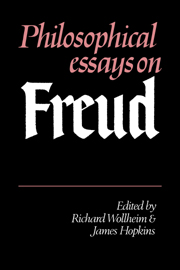Book contents
- Frontmatter
- Contents
- Introduction: philosophy and psychoanalysis
- 1 Conversations on Freud; excerpt from 1932–3 lectures
- 2 Freud, Kepler, and the clinical evidence
- 3 Critical empiricism criticized: the case of Freud
- 4 Freudian commonsense
- 5 Disposition and memory
- 6 On Freud's doctrine of emotions
- 7 The id and the thinking process
- 8 The bodily ego
- 9 Norms and the normal
- 10 On the generation and classification of defence mechanisms
- 11 Models of repression
- 12 Mauvaise foi and the unconscious
- 13 Self-deception and the ‘splitting of the ego’
- 14 Freud's anthropomorphism
- 15 Freud's anatomies of the self
- 16 Motivated irrationality, Freudian theory and cognitive dissonance
- 17 Paradoxes of irrationality
- Works of Freud cited
- Select bibliography
13 - Self-deception and the ‘splitting of the ego’
Published online by Cambridge University Press: 01 October 2009
- Frontmatter
- Contents
- Introduction: philosophy and psychoanalysis
- 1 Conversations on Freud; excerpt from 1932–3 lectures
- 2 Freud, Kepler, and the clinical evidence
- 3 Critical empiricism criticized: the case of Freud
- 4 Freudian commonsense
- 5 Disposition and memory
- 6 On Freud's doctrine of emotions
- 7 The id and the thinking process
- 8 The bodily ego
- 9 Norms and the normal
- 10 On the generation and classification of defence mechanisms
- 11 Models of repression
- 12 Mauvaise foi and the unconscious
- 13 Self-deception and the ‘splitting of the ego’
- 14 Freud's anthropomorphism
- 15 Freud's anatomies of the self
- 16 Motivated irrationality, Freudian theory and cognitive dissonance
- 17 Paradoxes of irrationality
- Works of Freud cited
- Select bibliography
Summary
Who can doubt that we do deceive ourselves? Yet who can explain coherently and explicitly how we do so?
Recent philosophical attempts at such explanation have centred around the assumption that, in essence, the self-deceiver is one who has got himself to believe what he (still) does not believe. So soon as the matter is put thus starkly we are faced with deep paradox, and a good deal of the recent philosophical discussion has been directed toward trying to save the concept while dissolving the paradox.
In the following, I propose a quite different approach to the analysis of self-deception, one which does not centre on the coexistence of inconsistent beliefs, and indeed does not centre on the understanding of self-deception in terms of belief at all. In consequence, the paradox inherent in the ‘two-belief’ approach does not arise, nor does any other paradox.
The analysis of self-deception which I present here is set beside certain of Freud's doctrines. Setting my own account alongside Freud's work is appropriate inasmuch as his doctrine on defence and the unconscious constitutes the most elaborately worked out, the most extensively applied contemporary doctrine touching self-deception. The juxtaposition of these ways of talking about self-deception results, as I see it, in helping to identify and resolve a central incompleteness in Freud's doctrine, an incompleteness whose centrality Freud himself had just come to appreciate at the very end of his life.
- Type
- Chapter
- Information
- Philosophical Essays on Freud , pp. 212 - 227Publisher: Cambridge University PressPrint publication year: 1982
- 1
- Cited by



